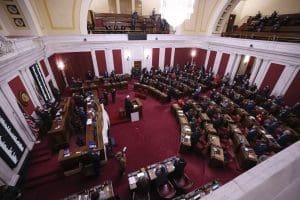West Virginia GOP wants to censor information about voting on social media
A bill introduced in the Legislature would also prevent social media companies from banning users who violate their rules.

West Virginia Republicans are attempting to pass legislation that would prevent social media companies like Facebook from publicly posting information about voting that has historically led to increased voter registration.
House Bill 3307, which passed the Republican-dominated West Virginia House of Delegates on March 31, would require platforms to get prior approval from the secretary of state every time they publish information on elections, including registration deadlines, the dates of elections, and information on identification requirements for voters. The bill is currently with the Senate Judiciary Committee.
The legislation was introduced by Del. Daniel Linville, who served as a delegate supporting Donald Trump at the 2020 Republican National Convention.
In 2020 West Virginia’s secretary of state, Mac Warner, joined a coalition of Republican secretaries of state who sent a letter to Facebook seeking to stop the platform from publishing election information through its Voting Information Center.
Jesse Little, vice president for campaigns at Common Cause, who obtained the letter via a Freedom of Information Act filing, described the letter to BuzzFeed as an attempt to “strong-arm Facebook.”
Facebook announced in October 2020 that it had helped to register 4.4 million voters around the country.
Republican lawmakers at both the state and the federal level have a history of trying to squelch voter registration drives and engaging in other vote suppression techniques specifically targeted at voters more likely to vote for Democratic candidates.
In addition to the vote suppression elements of Linville’s bill, the legislation would also prevent social media companies from banning users who violate the services’ rules on content.
The provision, described as the “Stop Social Media Censorship Act,” would prohibit the removal of an account based on political or religious speech.
The inclusion of the language follows Twitter’s decision to permanently ban Donald Trump from the service and Facebook’s decision to suspend his access to the platform after he posted election misinformation and was seen to use his account to incite violence.
The West Virginia proposal echoes an attempt by Republican lawmakers in Florida to fine networks that ban users for behavior similar to Trump’s.
Republicans have claimed that they are being censored on social media. In fact, Twitter allowed Trump to operate his account for years in spite of the kinds of violations of the platform’s terms of service that had resulted in other users being banned.
Published with permission of The American Independent Foundation.
Recommended

New NC GOP chair flirts with bogus stolen election conspiracies
Simmons predecessor was a staunch 2020 election denier
By Jesse Valentine - April 19, 2024
Texas activists pushed abortion restrictions in NM cities and counties, records show
Emails reveal influence and control in exchange for promises of legal help
By Austin Fisher, Source NM - March 04, 2024
Cannabis workers across Missouri begin push to unionize dispensaries
The first day was a breeze. Sean Shannon and Danny Foster walked into several marijuana dispensaries around Missouri with their matching “Union For Cannabis Workers” shirts and talked to employees about the possibility of unionizing. “The first day, there were 57 stops amongst the teams,” said Shannon, lead organizer with UFCW Local 655, which actually […]
By Rebecca Rivas - December 04, 2023










































































